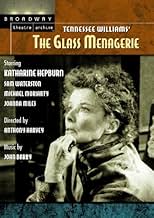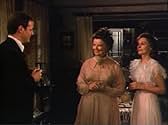Amanda Wingfield dominates her children with her faded gentility and exaggerated tales of her Southern belle past. Her son plans escape; her daughter withdraws into a dream world. When a "ge... Read allAmanda Wingfield dominates her children with her faded gentility and exaggerated tales of her Southern belle past. Her son plans escape; her daughter withdraws into a dream world. When a "gentleman caller" appears, things move to crisis point.Amanda Wingfield dominates her children with her faded gentility and exaggerated tales of her Southern belle past. Her son plans escape; her daughter withdraws into a dream world. When a "gentleman caller" appears, things move to crisis point.
- Director
- Writers
- Stars
- Won 4 Primetime Emmys
- 4 wins & 3 nominations total
- Director
- Writers
- All cast & crew
- Production, box office & more at IMDbPro
Featured reviews
Later, Tom is sitting at a table writing. Amanda comes over and scolds him for his poor posture: "Now why can't you sit up straight I know what that position does to your internal organs. Now you sit up straight; here I'll show you. Your stomach pressed against your lungs, your lungs pressed against your heart, and that poor little heart gets discouraged 'cause it hasn't got any room left to go on beatin' for you".
But that's Amanda: an overbearing busybody who means well, but dominates those around her. She is so sure of herself and her moral values. Tom feels trapped, not only by his mother but also because of his mundane job at a warehouse. Daughter Laura is crippled and has a dreadful inferiority complex, which makes her shy. She identifies with her tiny glass animals, as fragile as she is.
Set almost entirely indoors in a drab little apartment in St. Louis, "The Glass Menagerie" is a play that conveys a lot of human feelings: anger, guilt, regret, dependency, and emotional damage. There's also a bit of humor. The story takes place during the WWII era of the 1940s. Eventually, Amanda imposes her wishes on Laura as well, as the mother badgers Tom to bring home a "gentleman caller" for Laura, in an effort to prevent Laura from being an old maid. What follows is both inspiring and heartrending.
The claustrophobic script is talky as one would expect for a play. The drab costumes are appropriate given the family's financial straits and the time period. Camera is largely static and functions mainly as a fly on the wall. Casting is very good. Acting is terrific. Hepburn does a wonderful job, except that she talks too fast for a Southern woman. The ending leaves viewers hanging.
With minor exceptions, the script and the performances are marvelous. Yet I'm not sure I would want to watch the film again; it is so depressing, especially toward the end.
1973's "The Glass Menagerie" directed by Anthony Harvey and written by Stewart Stern, was a televised movie. Based on the play by Tennessee Williams, the movie's runtime is 100 minutes. Rated PG.
"The Glass Menagerie" is a drama set in an apartment in St. Louis, and most of the story takes place during the night. The story takes a dark turn towards the end and seems to phase into a tragedy that adds a sense of sadness. The movie definitely has its changes from the play, but then again, no movie follows the book perfectly. The movie has is still very intriguing to watch because of the life the actors put into their work, specifically Katherine Hepburn. Katherine Hepburn portrays an awesome 1940's mother who hasn't let go of the past. She consistently refers to her younger days when she had many "gentleman callers" and seems to envy her daughters young age, yet she is upset that she is wasting it. Laura's glass menagerie, which is what the movie is titled after, plays a significant role in the plot. Laura's menagerie symbolizes her own fragileness and foreshadows future events in the story. The screenplay by Stewart Stern forms a clear image of the main points of the original story written by Tennessee Williams. The movie may not depict the story line perfectly, but no movie ever compares to the book.
Did you know
- TriviaTennessee Williams preferred this film version of his play over the 1950 one.
- Quotes
Amanda Wingfield: You are the only young man that I know of who ignores the fact that the future becomes the present, the present becomes the past, and the past turns into everlasting regret if you don't plan for it.
- ConnectionsFeatured in The 26th Annual Primetime Emmy Awards (1974)
Details
- Release date
- Country of origin
- Official site
- Language
- Also known as
- Tennessee Williams' The Glass Menagerie
- Filming locations
- Production company
- See more company credits at IMDbPro
Contribute to this page

























